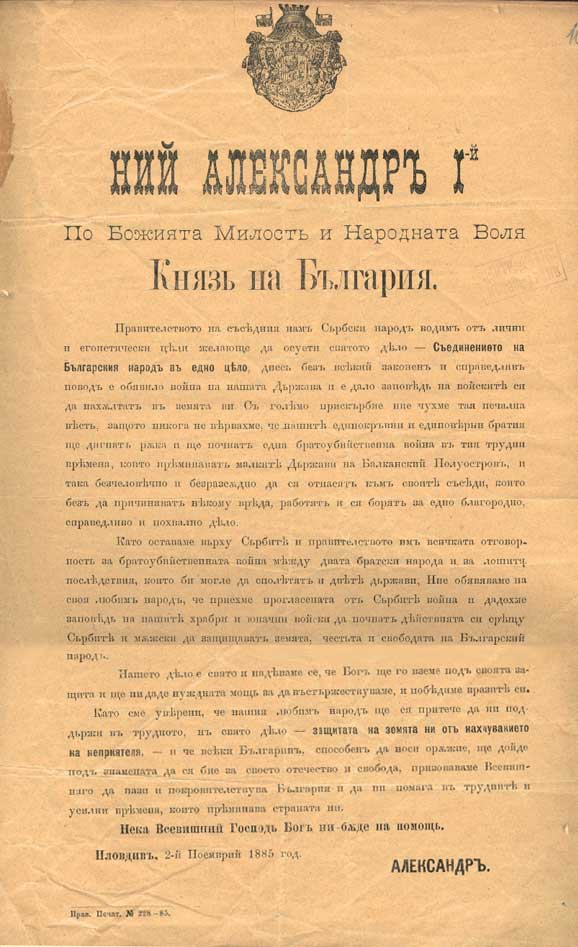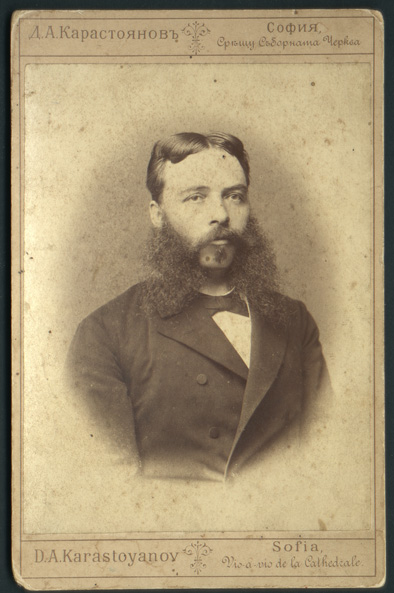|
Unification Day (Bulgaria)
Unification Day ( bg, Ден на Съединението, translit=Den na Saedinenieto) on 6 September is a national holiday of Bulgaria. It commemorates the unification of Eastern Rumelia and Bulgaria in 1885. By the terms of the Treaty of Berlin (1878), Southern Bulgaria (named Eastern Roumelia) was separated from the newly formed Bulgarian state and returned to the Ottoman Empire with partial autonomy. Bulgarian citizens considered the decisions of the Berlin Treaty to be unfair and began a peaceful demonstration against them. At first the plan was to annex all territories that Bulgaria had gained after the Treaty of San Stefano but later it became clear that was impossible because of the unsuitable international situation. The Bulgarians had to leave Macedonia and the rest of Thrace and concentrate on the East Roumelian issue. The first actions were taken in 1880 but the sharpened political situation, economic instability and the low prestige of the Bulgarian country del ... [...More Info...] [...Related Items...] OR: [Wikipedia] [Google] [Baidu] |
Nikolai Pavlovich
Nikolai Pavlovich (Bulgarian: Николай Павлович; 9 December 1835, Svishtov – 13 February 1894, Sofia) was a Bulgarian Nationalist painter, lithographer and illustrator. Biography He was the son of , a teacher and writer of the Bulgarian National Revival. His earliest works were illustrations for the ''Atlas Cosmobiographique'' and ''Atlas Meteorlogique''; books by Dr. Petar Beron that were later published in Paris. With the money he made from them, he was able to study in Vienna and at the Academy of Fine Arts, Munich, where he graduated in 1858.Jerome Stefanov, "Едно мнение за творчеството и мирогледа на Николай Павлович" (An Opinion About the Creativity and Outlook of Nikolai Pavlovich), in ''Проблеми на изкуство'' (Problems in Art), 1978, #4, pgs.48-52 His meticulous attention to detail, especially in his portraits, soon won him many offers of employment. After his return to Svishtov, he also ... [...More Info...] [...Related Items...] OR: [Wikipedia] [Google] [Baidu] |
Public Holidays In Bulgaria
The official public holidays in Bulgaria are listed in the table below. Other Observances * 1 March - Baba Marta Day - Баба Марта * 8 March - International Women's Day - Ден на жената * 8 March - Mother's Day - Ден на майката * 6 May - Armed Forces Day - Ден на въоръжените сили St. George's Day Former national holidays * 9 September - Day of the People's Uprising of 9 September (''Ден на народното въстание на 9 септември'') was celebrated in the People's Republic of Bulgaria until 1989. * 7 November - October Revolution Day (''Ден на октомврийската революция'') References {{Bulgaria topics Bulgaria Holidays A holiday is a day set aside by Norm (social), custom or by law on which normal activities, especially business or work including school, are suspended or reduced. Generally, holidays are intended to allow individuals to celebrate or commemorate . ... [...More Info...] [...Related Items...] OR: [Wikipedia] [Google] [Baidu] |
Serbo-Bulgarian War
The Serbo-Bulgarian War or the Serbian–Bulgarian War ( bg, Сръбско-българска война, ''Srăbsko-bălgarska voyna'', sr, Српско-бугарски рат, ''Srpsko-bugarski rat'') was a war between the Kingdom of Serbia and Principality of Bulgaria that erupted on and lasted until . Despite Bulgaria being a vassal state of the Ottoman Empire, the Turks did not intervene in the war. Serbia took the initiative in starting the war but was decisively defeated. Austria demanded Bulgaria stop its invasion, and a truce resulted. Final peace was signed on in Bucharest. The old boundaries were not changed. As a result of the war, European powers acknowledged the act of Unification of Bulgaria which happened on . Background On , Bulgaria and the semi-autonomous Ottoman province of Eastern Rumelia declared their unification in the city of Plovdiv. Eastern Rumelia, whose population was predominantly ethnic Bulgarian, had been an artificial creation of the ... [...More Info...] [...Related Items...] OR: [Wikipedia] [Google] [Baidu] |
Tarnovo
Veliko Tarnovo ( bg, Велико Търново, Veliko Tărnovo, ; "Great Tarnovo") is a town in north central Bulgaria and the administrative centre of Veliko Tarnovo Province. Often referred as the "''City of the Tsars''", Veliko Tarnovo is located on the Yantra River and is famously known as the historical capital of the Second Bulgarian Empire, attracting many tourists with its unique architecture. The old part of the town is situated on three hills, Tsarevets, Trapezitsa, and Sveta Gora, rising amidst the meanders of the Yantra. On Tsarevets are the palaces of the Bulgarian emperors and the Patriarchate, the Patriarchal Cathedral, and also a number of administrative and residential edifices surrounded by thick walls. Trapezitsa is known for its many churches and as the former main residence of the nobility. During the Middle Ages, the town was among the main European centres of culture and gave its name to the architecture of the Tarnovo Artistic School, painting of t ... [...More Info...] [...Related Items...] OR: [Wikipedia] [Google] [Baidu] |
Alexander, Prince Of Bulgaria
Alexander Joseph ( bg, Александър I Батенберг; 5 April 185717 November 1893), known as Alexander of Battenberg, was the first prince (''knyaz'') of the Principality of Bulgaria from 1879 until his abdication in 1886. The Bulgarian Grand National Assembly elected him as Prince of autonomous Bulgaria, which officially remained within the Ottoman Empire, in 1879. He dissolved the assembly in 1880 and suspended the Constitution in 1881, considering it too liberal. He restored the Constitution in 1883, leading to open conflict with Russia that made him popular in Bulgaria. Unification with Eastern Rumelia was achieved and recognised by the powers in 1885. A coup carried out by pro-Russian Bulgarian Army officers forced him to abdicate in September 1886. He later became a general in the Austrian army. Early life Alexander was the second son of Prince Alexander of Hesse and by Rhine by the latter's morganatic marriage with Countess Julia von Hauke. The Countess and h ... [...More Info...] [...Related Items...] OR: [Wikipedia] [Google] [Baidu] |
Knyaz
, or ( Old Church Slavonic: Кнѧзь) is a historical Slavic title, used both as a royal and noble title in different times of history and different ancient Slavic lands. It is usually translated into English as prince or duke, depending on specific historical context and the potentially known Latin equivalents of the title for each bearer of the name. In Latin sources the title is usually translated as , but the word was originally derived from the common Germanic (king). The female form transliterated from Bulgarian and Russian is (), in Slovene and Serbo-Croatian (Serbian Cyrillic: ), ''kniahinia'' (княгіня) in Belarusian and ''kniazioŭna'' (князёўна) is the daughter of the prince, (княгиня) in Ukrainian. In Russian, the daughter of a knyaz is (). In Russian, the son of a knyaz is ( in its old form). The title is pronounced and written similarly in different European languages. In Serbo-Croatian and some West Slavic languages, the word ... [...More Info...] [...Related Items...] OR: [Wikipedia] [Google] [Baidu] |
Danail Nikolaev
Danail Tsonev Nikolaev ( bg, Данаил Цонев Николаев; 30 December 1852 – 29 August 1942) was a Bulgarian officer and Minister of War on the eve of the Balkan wars. He was the first person to attain the highest rank in the Bulgarian military, General of the infantry. He was also known as ''"the patriarch of the Bulgarian military"''. Biography Danail Nikolaev was born in Bolgrad, Russian Empire (now Ukraine) to a Bulgarian family, who were refugees from Tarnovo. In 1871 he graduated from the Bolgrad Gymnasium and joined the Volunteer company of 54th Minsk regiment. On 19 September 1873 he joined the Infantry school in Odessa as a cadet, graduating in 1875. Nikolaev returned to his regiment in Chişinău as an acting cadet on 20 July. Realizing that Serbia was preparing for war with the Ottoman empire, he requested resignation from military service to join the war on 14 June 1876. His request was reviewed by division commander General Dragomirov, who fu ... [...More Info...] [...Related Items...] OR: [Wikipedia] [Google] [Baidu] |
Major
Major (commandant in certain jurisdictions) is a military rank of commissioned officer status, with corresponding ranks existing in many military forces throughout the world. When used unhyphenated and in conjunction with no other indicators, major is one rank above captain, and one rank below lieutenant colonel. It is considered the most junior of the field officer ranks. Background Majors are typically assigned as specialised executive or operations officers for battalion-sized units of 300 to 1,200 soldiers while in some nations, like Germany, majors are often in command of a company. When used in hyphenated or combined fashion, the term can also imply seniority at other levels of rank, including ''general-major'' or ''major general'', denoting a low-level general officer, and ''sergeant major'', denoting the most senior non-commissioned officer (NCO) of a military unit. The term ''major'' can also be used with a hyphen to denote the leader of a military band such as ... [...More Info...] [...Related Items...] OR: [Wikipedia] [Google] [Baidu] |
Georgi Stranski
Georgi Ivanov Stranski ( bg, Георги Иванов Странски) (13 August 1847 – 17 January 1904) was a Bulgarian physician and politician. A close friend of Hristo Botev, Stranski was an active member of various organizations founded by Bulgarian emigrants in Romania (the United Principalities). After the Liberation of Bulgaria in 1878, Stranski was one of the leaders of the Liberal Party of Eastern Rumelia, and its successor after the Bulgarian unification in 1885, the all-Bulgarian People's Liberal Party of Stefan Stambolov. Between the accomplishment of the Bulgarian unification on 6 September 1885 and its international recognition in mid-1886, Stranski was the only ever Commissar of South Bulgaria. Biography Georgi Stranski was born on in Kalofer, a Sub-Balkan town in Rumelia, or the European part of the Ottoman Empire (today in central Bulgaria). In 1864, he moved to Bucharest, at the time the capital of the autonomous United Principalities of Wallachia and Mol ... [...More Info...] [...Related Items...] OR: [Wikipedia] [Google] [Baidu] |
Istanbul
Istanbul ( , ; tr, İstanbul ), formerly known as Constantinople ( grc-gre, Κωνσταντινούπολις; la, Constantinopolis), is the List of largest cities and towns in Turkey, largest city in Turkey, serving as the country's economic, cultural and historic hub. The city straddles the Bosporus strait, lying in both Europe and Asia, and has a population of over 15 million residents, comprising 19% of the population of Turkey. Istanbul is the list of European cities by population within city limits, most populous European city, and the world's List of largest cities, 15th-largest city. The city was founded as Byzantium ( grc-gre, Βυζάντιον, ) in the 7th century BCE by Ancient Greece, Greek settlers from Megara. In 330 CE, the Roman emperor Constantine the Great made it his imperial capital, renaming it first as New Rome ( grc-gre, Νέα Ῥώμη, ; la, Nova Roma) and then as Constantinople () after himself. The city grew in size and influence, eventually becom ... [...More Info...] [...Related Items...] OR: [Wikipedia] [Google] [Baidu] |
Gavril Krastevich
Gavril Krastevich ( bg, Гаврил Кръстевич; 5 April 1817 – 19 November 1898) was a Bulgarian politician and historian, and the first translator of Benjamin Franklin into Bulgarian. He was born in Kotel in 1817. He was Governor General of Eastern Rumelia between 1884 and 1885 when it was part of the Ottoman Empire.See Krastevich died in Istanbul on 16 November 1898. Honorary member of the Bulgarian Academy of Sciences The Bulgarian Academy of Sciences (abbreviated BAS; bg, Българска академия на науките, ''Balgarska akademiya na naukite'', abbreviated ''БАН'') is the National Academy of Bulgaria, established in 1869. The Academy .... References {{DEFAULTSORT:Krastevich, Gavril Bulgarian politicians Governors-general Governors-General of Eastern Rumelia Members of the Bulgarian Academy of Sciences People from Kotel, Bulgaria 1817 births 1898 deaths 19th-century Bulgarian people ... [...More Info...] [...Related Items...] OR: [Wikipedia] [Google] [Baidu] |




